Journey to the U.S. Partner Diakonie: Politically Louder, Socially Sustainable
This interview was conducted by Sabine Damaschke, part of the German delegation from Diakonie Rheinland Westphalia Lippe (RWL), during the delegation’s attendance at CHHSM’s Annual Gathering in St. Louis.
At this year’s annual gathering of our U.S. partner deaconry, the Council for Health and Human Service Ministries (CHHSM), a German delegation from Diakonie Rheinland Westphalia Lippe was present for the first time in five years. CHHSM President Michael Readinger would like to deepen this German-American exchange. Despite our many differences, he sees many similarities in our social and political work.
What significance do these annual meetings have for CHHSM?
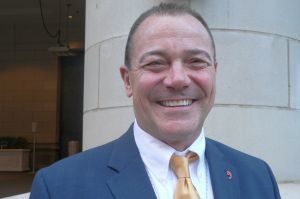
Michael Readinger has been CHHSM President for nearly four years.
It has been a long tradition in our organization to meet once a year for an exchange of our membership. This year was our 80th Annual Gathering, attended by over 130 CEOs and employees from all over the USA. Although our history goes back to the 1880s, CHHSM has existed in the current form since 1985. Compared to the Diakonie RWL, which has more than 2,700 organizations in its membership and 200 employees, we are a small association with only five permanent employees. We have 68 members representing about 400 social institutions.
Why did you choose St. Louis as the venue?
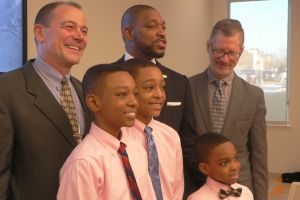
Michael Readinger in the opening service with the Rev. Starsky Wilson, Wilson’s three sons, and UCC President the Rev. John Dorhauer. Wilson, also CEO of the Deaconess Foundation, is a prominent figure in the “Black Lives Matter” movement in St. Louis.
We like to refer to St. Louis as one of the “hot beds” of our social work because 13 of our member organizations are located here. Many were founded in the 19th century by German immigrants who belonged to UCC predecessor denomination churches and many have celebrated a centenary in recent years. Although St. Louis has developed into a wealthy university town, there are many socially disadvantaged neighborhoods where families desperately need help. Having the CHHSM Annual Gathering in St. Louis also provided a nice opportunity to welcome the new Deaconess Center for Child Well-Being. We solemnly consecrated this space as a conference, education and training center of the Deaconess Foundation in our opening worship service.
What was the focus of your conference this time?
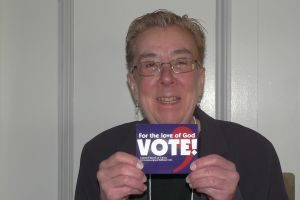
Sandra Sorenson, of the UCC’s Washington office, urged CHHSM attendees to engage in greater U.S. voter turnout.
We wanted to address the topic of “Advocacy.” The climate in Washington has changed a lot under President Donald Trump. After eight years of a Democrat in the role of the President, we have a new administration and are facing cuts in public social programs and a more rigorous immigration policy. As the UCC, we need to be louder and more visible in public to make our voice heard in Washington where we have an advocacy office.
Together with the UCC General Synod, we drafted a resolution against gun violence last year. After the recent killing spree by a student at a high school in Florida, the issue of gun control is again highly topical. The next General Synod will take place in 2019. We are preparing a drug abuse prevention resolution to present at the 2019 General Synod. That’s a huge problem as in this country — more people die of drug overdoses than gun violence. In 2016, there were 42,249 Americans who died of an overdose.
What are the biggest challenges for your association?
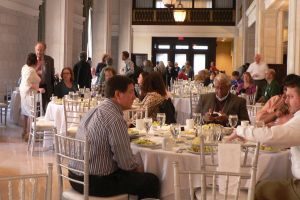
At dinner, the joyous conversations continued.
One challenge is that many leaders of our organizations, who are well connected with CHHSM, are retiring at the moment. Their successors are often not as involved in our association. We need to work with these organizations to make sure that the faith-based, UCC-related heritage is remembered during the time of transition. Another big challenge is the shortage of skilled workers in the field of health care. In our member institution Emmaus Homes, for example, there are currently 175 positions open. As the need for assistance is growing among the American population, we need to make a greater effort to attract all types of staff to care for people in all areas.
What do you expect from the German-American partnership with Diakonie RWL?
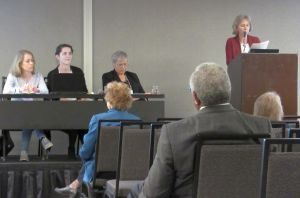
Well attended and much praised: the presentation of the German delegation about their diaconal work.
My dream is that we meet more often. Most recently, a delegation from CHHSM was in Germany in September 2017 and a German delegation of Diakonie RWL was with us five years ago. We need this international exchange because we have similar problems politically, economically and socially — however different our social systems in Germany and the U.S. are. I hope for a stable and sustainable exchange program, which would include a program for exchange of interns. We can learn a lot from each other if we allow employees of our organizations to regularly work at each other’s member organizations for up to three months. Incidentally, we could also open this exchange program to college students majoring in social work.
Join Our Mailing LIst
Follow on Facebook
Roller Retires from United Church Outreach Ministry (UCOM) - CHHSM
www.chhsm.org
The Rev. Dr. Bruce Roller officially retired from his position as executive director of United Church Outreach Ministry (UCOM) April. 1. Roller has served UCOM with dedication and distinction for 21 y...